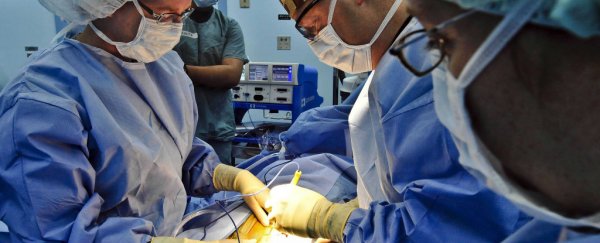Just months after doctors announced the success of the most extensive face transplant ever performed, which gave a severely injured fireman new facial features, better eyesight, and a full head of hair, surgeons in the US have announced that they will be performing the country's first ever penis transplant within a year.
The procedure, which will attempt to transplant a donor penis onto a young military veteran, will be the third penis transplant ever performed. If successful, the surgical team from Johns Hopkins University School of Medicine says it will continue to work with veterans who have suffered traumatic injuries to their genitals in the field.
According to the US Department of Defense Trauma Registry, between 2001 and 2013, a total of 1,367 soldiers sustained injuries to their genitals in the line of duty in Afghanistan or Iraq, mostly due to homemade bombs detonating nearby. Most of these soldiers were under 35 years of age, and have to spend the rest of their lives dealing with a life-altering injury that people don't like to talk about.
"These genitourinary injuries are not things we hear about or read about very often," W. P. Andrew Lee, the chairman of plastic and reconstructive surgery at Johns Hopkins, told Denise Grady at The New York Times. "I think one would agree it is as devastating as anything that our wounded warriors suffer, for a young man to come home in his early 20s with the pelvic area completely destroyed."
The plan is to attach a penis from a deceased donor to the veteran, and within months, restore proper uninary function, feeling in the organ, and the ability to have sex and maybe even father children (if the testes remain). While these are all realistic goals - so long as the recipient has retained certain nerves, blood vessels, and his urethra - the success of the procedure is far from certain.
So far, there have been just two penis transplants performed in the world, and only one of these has ended in success. The world's first penis transplant was completed in China in 2006, but two weeks after the 15-hour procedure to attach a 10-cm donor penis to the 44-year-old patient, it had to be removed again.
While the donor penis worked fine, restoring urinary function and the capacity to have sex, the recipient just couldn't get past the severe psychological effects that can come from having someone else's appendage attached to your body.
"Because of a severe psychological problem of the recipient and his wife, the transplanted penis regretfully had to be cut off," Weilie Hu, a surgeon at Guangzhou General Hospital, told the press at the time.
The Guardian reported that an examination of the organ showed no signs of it being rejected by the body, but more recently, the Johns Hopkins surgeons told The New York Times that photographs of the transplant revealed patches of dead and peeling skin, possibly because the penis had inadequate blood flow.
"Psychological consequences of hand and face allografts show that it is not so easy to use and see permanently a dead person's hands, nor is it easy to look in a mirror to see a dead person's face," French surgeon, Jean-Michel Dubernard, who performed the world's first face transplant in 2006, wrote in the journal European Urology. "Clearly, in the Chinese case the failure at a very early stage was first psychological. It involved the recipient's wife and raised many questions."
Fortunately, the world's second penis transplant has seen greater success so far. Performed on a young man last year in South Africa, the procedure has not only seen him regain proper uniary function, but he's been able to successfully father a child.
The team at Johns Hopkins has been given permission to perform 60 penis transplants in the coming years, and a study will be done on the results to determine if the procedure can be upgraded from 'experimental' to being made available as a standard treatment. While the university will be footing the bill for this particular procedure, the cost would usually be somewhere between US$200,000 and $400,000, and at this stage, only army veterans will be eligible. Recipients will then need to take anti-rejection medicine for the rest of their lives, and a one-off infusion of stem cells from the donor.
While some people have criticised the procedure as unwarranted and non-essential because not having a penis isn't a life-threatening condition, doctors and veterans alike say they cannot overstate the importance of making procedures like this available.
"I don't care who you are - military, civilian, anything - you have an injury like this, it's more than just a physical injury," Sgt. First Class Aaron Causey, who lost both his legs and most of his testicles in Afghanistan, said to Denise Grady at The New York Times, adding that the damage to his testicles was by far more troubling to him than the loss of his legs.
"To be missing the penis and parts of the scrotum is devastating," Richard J. Redett, director of paediatric plastic and reconstructive surgery at Johns Hopkins, told The Times. "That part of the body is so strongly associated with your sense of self and identity as a male. These guys have given everything they have."
